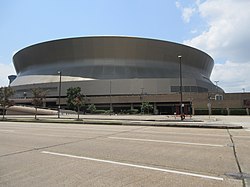| 1995 USF&G Insurance Sugar Bowl | |||||||||||||||||||||||||
|---|---|---|---|---|---|---|---|---|---|---|---|---|---|---|---|---|---|---|---|---|---|---|---|---|---|
| 61st Sugar Bowl | |||||||||||||||||||||||||
 The Louisiana Superdome in New Orleans, Louisiana, hosted the Sugar Bowl. | |||||||||||||||||||||||||
| |||||||||||||||||||||||||
| |||||||||||||||||||||||||
| Date | January 2, 1995 | ||||||||||||||||||||||||
| Season | 1994 | ||||||||||||||||||||||||
| Stadium | Louisiana Superdome | ||||||||||||||||||||||||
| Location | New Orleans, Louisiana | ||||||||||||||||||||||||
| MVP | TB Warrick Dunn (Florida State) | ||||||||||||||||||||||||
| Favorite | Florida by 1.5 points (54.5) [1] [2] | ||||||||||||||||||||||||
| Referee | Steve Usechek (Big Eight) | ||||||||||||||||||||||||
| Attendance | 76,224 | ||||||||||||||||||||||||
| United States TV coverage | |||||||||||||||||||||||||
| Network | ABC | ||||||||||||||||||||||||
| Announcers | Brent Musburger and Dick Vermeil | ||||||||||||||||||||||||
The 1995 Sugar Bowl (January) was the 9th Sugar Bowl played on January 2 (since January 1 fell on a Sunday) and only the 13th to not be played on January 1. This was the 61st held Sugar Bowl, and it was the postseason game for the 1994 NCAA Division I-A football season. The game was a bowl rematch between the Florida Gators and the Florida State Seminoles who had played each other in the regular season on November 26.